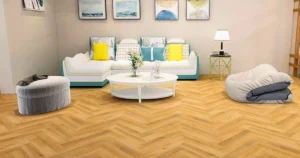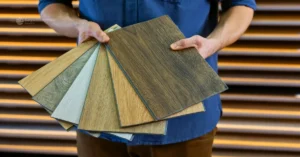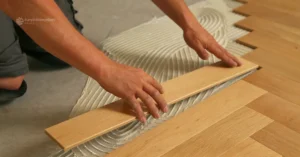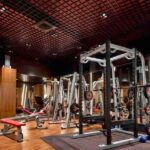-
Address: Thrissur, Kerala, India
-
Phone: +91 9422064023
SPC Flooring: The Ultimate Choice for Durable and Waterproof Floors in Kerala
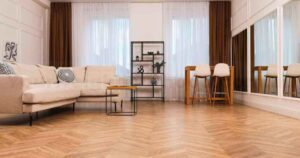
When it comes to modern flooring solutions, two terms often come up: PVC flooring and SPC flooring. While both are types of vinyl flooring, they possess distinct characteristics that make them suitable for different applications. In Kerala’s unique climate, choosing the right flooring is crucial for longevity and comfort. This comprehensive guide will delve into the world of SPC flooring, comparing it with PVC flooring to help you make an informed decision for your home or commercial space in Kerala.
SPC Flooring GuideTable of Contents
Understanding PVC Flooring
PVC, or Polyvinyl Chloride flooring, is a widely used type of resilient flooring. It’s known for its flexibility, affordability, and a good range of design options. PVC flooring typically consists of multiple layers, including a wear layer, a print layer, and a PVC backing. Its softer composition makes it comfortable underfoot and relatively easy to install. However, its flexibility can also be a drawback in certain environments, as it may be more susceptible to dents and expansion/contraction with temperature changes.
Understanding SPC Flooring: The Future of Durable Floors
SPC flooring, which stands for Stone Plastic Composite, is a revolutionary type of engineered flooring known for its exceptional durability and waterproof nature. It’s made by blending natural limestone powder, polyvinyl chloride, and stabilizers, resulting in a rigid core. This makes it a popular choice for areas prone to moisture and high traffic, such as kitchens, bathrooms, living rooms, and commercial spaces.
Composition of SPC Flooring
The core of SPC flooring is its defining feature. Unlike traditional vinyl, SPC’s core is composed of approximately 60% limestone powder, 30% PVC, and 10% stabilizers. This unique blend creates an ultra-dense and rigid board that is significantly more stable and resistant to impacts than other vinyl options.
Key Features of SPC Flooring
- Waterproof: The inherent waterproof nature of SPC flooring makes it ideal for areas where water damage is a concern, including bathrooms, kitchens, and basements. Spills and moisture are no match for its robust construction.
- Durability: Its rigid core makes it highly resistant to scratches, dents, and wear and tear. This makes SPC flooring an excellent choice for high-traffic areas in both residential and commercial settings, ensuring your floors look new for longer.
- Aesthetics: SPC flooring can be designed to mimic the authentic look of wood, tile, or stone, offering a wide range of design options to suit any interior style. Advanced printing technologies allow for realistic textures and patterns.
- Installation: SPC flooring is generally easy to install, often using click-lock systems. This makes it a popular choice for DIY enthusiasts and can significantly reduce installation time and costs. It can often be installed over existing hard flooring surfaces. For more detailed steps, refer to our vinyl flooring installation guide.
- Cost: SPC flooring can be more affordable than some traditional flooring options like hardwood or natural stone, while still providing a high level of durability and aesthetics, offering excellent value for money.
PVC vs. SPC Flooring: A Detailed Comparison
While both PVC and SPC flooring fall under the umbrella of vinyl flooring, their core differences lead to significant variations in performance and suitability.
Core Composition: The Fundamental Difference
- PVC Flooring: Features a flexible PVC core, which gives it a softer feel but also makes it more prone to indentation and less stable under temperature fluctuations.
- SPC Flooring: Boasts a rigid, stone-plastic composite core. This provides superior stability, making it highly resistant to expansion, contraction, and dents.
Durability and Impact Resistance
- PVC Flooring: Good durability for light to medium traffic, but can be susceptible to dents from heavy objects or furniture.
- SPC Flooring: Exceptional durability and impact resistance due to its rigid core. It stands up remarkably well to heavy foot traffic, pets, and dropped items, making it a long-lasting flooring solution.
Water Resistance and Stability
- PVC Flooring: Generally water-resistant, but prolonged exposure to water or significant temperature changes can lead to warping or buckling.
- SPC Flooring: 100% waterproof. Its rigid core prevents expansion and contraction, making it incredibly stable even in high-moisture environments or areas with fluctuating temperatures. This is a major advantage for SPC flooring in Kerala.
Comfort and Underfoot Feel
- PVC Flooring: Tends to be softer and more flexible, offering a slightly more comfortable feel underfoot.
- SPC Flooring: Its rigid core makes it firmer. However, many SPC products come with an attached underlayment for added comfort and sound absorption.
Installation Process
- PVC Flooring: Can be installed using glue-down or click-lock methods, often requiring a perfectly level subfloor due to its flexibility.
- SPC Flooring: Primarily uses click-lock systems, making installation quicker and easier. Its rigidity allows it to be installed over minor subfloor imperfections without telegraphing.
Cost-Effectiveness
- PVC Flooring: Generally more budget-friendly upfront.
- SPC Flooring: While slightly higher in initial cost than basic PVC, its superior durability and longevity often make it more cost-effective in the long run, reducing the need for frequent replacements or repairs.
Product Attribute Comparison Table
| Attribute | PVC Flooring | SPC Flooring |
|---|---|---|
| Core Composition | Flexible PVC | Rigid Stone Plastic Composite (Limestone + PVC) |
| Thickness | 2mm – 5mm | 3.5mm – 8mm |
| Durability | Good for light-medium traffic | Excellent for heavy traffic, highly dent-resistant |
| Waterproof | Water-resistant, can warp with prolonged exposure | 100% Waterproof, highly stable |
| Stability | Less stable, prone to expansion/contraction | Highly stable, minimal expansion/contraction |
| Comfort | Softer, more flexible | Firmer, often with attached underlayment for comfort |
| Installation | Glue-down or click-lock, needs perfect subfloor | Click-lock, can go over minor subfloor imperfections |
| Cost | Generally lower upfront | Slightly higher upfront, better long-term value |
| Applications | Residential, light commercial | Residential, heavy commercial, high-moisture areas |
Why Choose SPC Flooring in Kerala?
Kerala’s tropical climate, characterized by high humidity and occasional heavy rainfall, poses unique challenges for flooring. This is where SPC flooring in Kerala truly shines. For a broader understanding of vinyl flooring in Kerala, explore our detailed guide.
Ideal for Kerala’s Climate
The 100% waterproof and highly stable nature of SPC flooring makes it perfectly suited for Kerala’s humid conditions. Unlike wood or laminate, it won’t swell, warp, or buckle due to moisture, ensuring your floors remain pristine year-round.
Durability for High-Traffic Homes
Kerala homes often experience significant foot traffic, especially during festive seasons or family gatherings. The exceptional durability and dent resistance of SPC flooring mean it can withstand the rigors of daily life, making it a practical and long-lasting choice for busy households.
Aesthetic Versatility
Whether you prefer the classic elegance of wood, the sleek look of modern tiles, or the rustic charm of stone, SPC flooring offers an incredible array of designs. This versatility allows homeowners in Kerala to achieve their desired aesthetic without compromising on performance. You can explore our range of vinyl flooring products to find the perfect match.
Easy Maintenance
Maintaining SPC flooring is a breeze. Its waterproof surface makes cleaning simple – a quick sweep and damp mop are usually all that’s needed. This low-maintenance aspect is a huge advantage for busy individuals and families.
Use Cases and Applications for SPC Flooring
The versatility and robust nature of SPC flooring make it suitable for a wide range of environments. For a comprehensive guide to vinyl flooring and its applications, visit our dedicated page.
Residential Applications
- Kitchens and Bathrooms: Its waterproof properties make it ideal for these moisture-prone areas.
- Living Rooms and Bedrooms: Offers a comfortable and stylish surface that can withstand daily wear and tear.
- Basements and Utility Rooms: Provides a durable and moisture-resistant solution for lower levels.
- Children’s Playrooms: Resists spills, scratches, and dents from active play.
Commercial Applications
- Retail Stores: Can handle heavy foot traffic and provides a professional aesthetic.
- Offices: Offers a durable and easy-to-maintain surface for workspaces.
- Restaurants and Cafes: Resists spills and stains, making it hygienic and easy to clean.
- Healthcare Facilities: Provides a sterile and durable surface.
- Hotels and Hospitality: Offers a luxurious look with high performance.
Frequently Asked Questions (FAQ) about SPC Flooring
Is SPC flooring truly waterproof?
Yes, SPC flooring is 100% waterproof. Its core is made from a blend of stone powder and PVC, which does not absorb water, making it impervious to spills and moisture.
How long does SPC flooring last?
With proper installation and maintenance, SPC flooring can last anywhere from 15 to 25 years or even longer, depending on the quality of the product and the amount of traffic it endures.
Can SPC flooring be installed over existing tiles?
In many cases, yes. The rigid core of SPC flooring allows it to be installed over existing hard surfaces like tiles, provided the subfloor is relatively flat and stable. This can save time and money on subfloor preparation. For more details on the installation process, refer to our guide.
Is SPC flooring eco-friendly?
Many SPC flooring products are considered more eco-friendly than traditional vinyl as they often contain recycled materials and are free from harmful chemicals like formaldehyde. Always check for certifications like FloorScore for environmental standards.
What is the average cost of SPC flooring in Kerala?
The cost of SPC flooring in Kerala can vary widely based on brand, thickness, wear layer, and design complexity. Generally, it ranges from ₹80 to ₹250 per square foot, excluding installation charges. It’s advisable to get quotes from local suppliers for accurate pricing. You can also browse our range of vinyl flooring products for options.
In conclusion, while PVC flooring offers a budget-friendly and flexible option, SPC flooring stands out as a superior choice for those seeking ultimate durability, waterproof capabilities, and long-term stability. For homes and businesses in Kerala, where humidity and resilience are key considerations, SPC flooring provides an ideal, high-performance, and aesthetically pleasing flooring solution.


